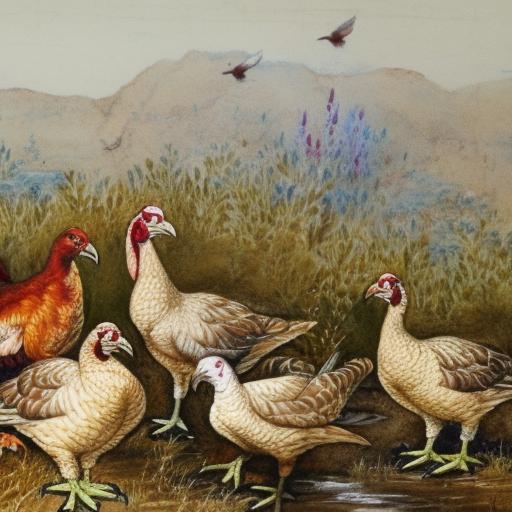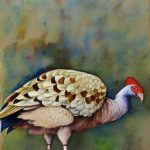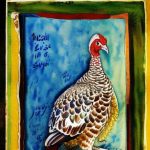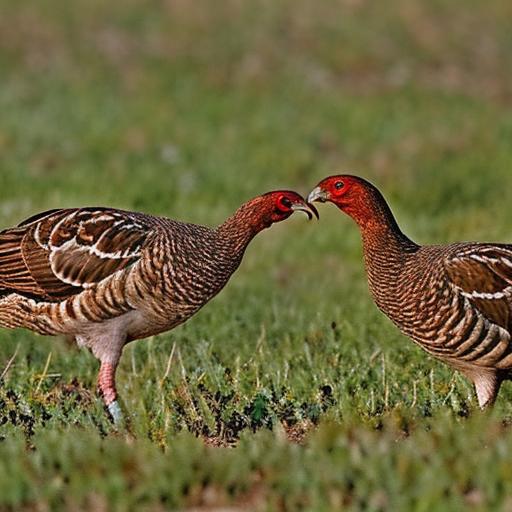Heritage turkeys are a special breed of turkey that have a long and storied history in the United States. These birds are descendants of the wild turkeys that were domesticated by Native Americans and later bred by European settlers. They are known for their rich flavor, succulent meat, and beautiful plumage. Unlike the broad-breasted white turkeys that dominate the commercial market, heritage turkeys are a diverse group of breeds that have been carefully preserved for their unique characteristics. These birds are raised on small farms and are often allowed to roam freely, leading to a more natural and healthy lifestyle. As consumers become more interested in sustainable and ethically-raised food, the demand for heritage turkeys has been on the rise.
Key Takeaways
- Heritage turkeys are traditional breeds that have been raised for centuries and are known for their rich flavor and unique appearance.
- The market for heritage turkeys is growing as consumers seek out more sustainable and ethically raised options for their holiday meals.
- The costs of breeding heritage turkeys can be higher than raising conventional breeds due to their slower growth rate and need for more space and specialized care.
- Potential profits from breeding heritage turkeys can be significant, especially for small-scale farmers who can sell them at a premium price to niche markets.
- Challenges of breeding heritage turkeys include finding a market for the birds, managing their slower growth rate, and ensuring genetic diversity for long-term sustainability and conservation efforts.
The Market for Heritage Turkeys
The market for heritage turkeys has been steadily growing in recent years as consumers seek out more flavorful and ethically-raised alternatives to the mass-produced birds found in supermarkets. Many people are willing to pay a premium for heritage turkeys because they appreciate the superior taste and texture of the meat, as well as the ethical and environmental benefits of supporting small-scale farmers. In addition, there is a growing interest in preserving rare and endangered breeds of livestock, including heritage turkeys, which adds to the appeal of these birds. As a result, there is a niche market for heritage turkeys that is willing to pay a higher price for a superior product. This presents an opportunity for small-scale farmers to enter the market and capitalize on the demand for heritage turkeys.
Costs of Breeding Heritage Turkeys
Breeding heritage turkeys can be a costly endeavor, especially for those who are just starting out. The initial investment in breeding stock, housing, and equipment can be significant, and ongoing expenses such as feed, veterinary care, and marketing must also be taken into account. Additionally, heritage turkeys require more space and time to mature compared to commercial breeds, which can further increase the cost of production. It is important for breeders to carefully consider these expenses and develop a comprehensive business plan before getting started in order to ensure that they can cover their costs and turn a profit.
Breeding heritage turkeys also requires specialized knowledge and skills, which may necessitate additional training or education. Farmers must be familiar with the specific needs of heritage breeds and be prepared to provide the care and attention that these birds require. This can involve additional time and labor, which should be factored into the overall cost of breeding heritage turkeys. Additionally, breeders may need to invest in marketing and promotional efforts to reach potential customers and differentiate their product in a competitive market.
Potential Profits from Breeding Heritage Turkeys
Despite the initial costs and ongoing expenses associated with breeding heritage turkeys, there is potential for significant profits for those who are able to successfully enter the market. As mentioned earlier, there is a niche market for heritage turkeys that is willing to pay a premium for a superior product. This means that breeders can command higher prices for their birds, which can help offset the higher cost of production. In addition, heritage turkeys have a longer growing period compared to commercial breeds, which means that they can be sold at a higher weight and therefore fetch a higher price per bird.
Furthermore, breeding heritage turkeys can also provide opportunities for diversification and value-added products. For example, breeders can sell turkey eggs, feathers, or processed products such as smoked turkey or turkey sausage, which can help increase overall revenue. By tapping into different market segments and offering a range of products, breeders can maximize their profits and make the most of their investment in breeding heritage turkeys.
Challenges of Breeding Heritage Turkeys
While there are potential profits to be made from breeding heritage turkeys, there are also significant challenges that breeders must navigate in order to be successful. One of the main challenges is the limited availability of breeding stock for heritage turkeys. Many of these breeds are rare and endangered, which means that finding quality breeding birds can be difficult and expensive. Breeders must carefully select their breeding stock in order to maintain genetic diversity and avoid inbreeding, which can be a complex and time-consuming process.
In addition, heritage turkeys are more susceptible to certain diseases and health issues compared to commercial breeds, which can increase the risk of losses for breeders. This means that breeders must be vigilant about providing proper care and management for their birds in order to ensure their health and well-being. Furthermore, heritage turkeys require more space and time to mature compared to commercial breeds, which can further complicate production and increase costs.
Sustainability and Conservation of Heritage Turkeys

One of the key benefits of breeding heritage turkeys is the role that it plays in sustainability and conservation efforts. By raising rare and endangered breeds of turkeys, breeders are helping to preserve genetic diversity and prevent these unique birds from becoming extinct. This is important not only for the cultural and historical significance of these breeds but also for the overall health of the livestock industry. Preserving genetic diversity can help protect against disease outbreaks and other threats that could impact the broader turkey population.
Furthermore, breeding heritage turkeys on small-scale farms can contribute to sustainable agricultural practices by promoting biodiversity, reducing reliance on industrial farming methods, and supporting local economies. By choosing heritage turkeys over mass-produced commercial breeds, consumers are also supporting sustainable farming practices and ethical treatment of animals. This aligns with the growing consumer demand for transparent and ethical food production methods, which can further drive the market for heritage turkeys.
Is Breeding Heritage Turkeys Profitable?
In conclusion, breeding heritage turkeys can be a profitable venture for small-scale farmers who are willing to invest the time, resources, and expertise required to enter this niche market. While there are significant costs associated with breeding heritage turkeys, there is also potential for substantial profits due to the growing demand for these unique birds. By carefully considering the costs of production, developing a comprehensive business plan, and tapping into different market segments, breeders can maximize their profits and make the most of their investment in breeding heritage turkeys.
However, it is important for breeders to be aware of the challenges associated with breeding heritage turkeys, including limited availability of breeding stock, susceptibility to diseases, and longer growing periods. By addressing these challenges through careful selection of breeding stock, proper care and management practices, and diversification of products, breeders can mitigate risks and increase their chances of success in the market for heritage turkeys. Ultimately, breeding heritage turkeys not only offers potential profits but also contributes to sustainability and conservation efforts, making it a rewarding endeavor for those who are passionate about preserving rare breeds and providing high-quality food products to consumers.
If you’re considering breeding heritage turkeys, you may also be interested in learning about the best housing options for your poultry. Poultry Wizard offers valuable insights into different types of chicken coops, including the convenient Snaplock Chicken Coop and the space-saving A-Frame Chicken Coop. Understanding where to put your chicken coop is crucial for the well-being of your birds, and Poultry Wizard provides expert advice on this topic. Check out their article on where to put a chicken coop to ensure that your turkeys and chickens have a comfortable and safe living environment.
FAQs
What are heritage turkeys?
Heritage turkeys are traditional breeds of turkeys that have been raised for centuries. They are known for their flavorful meat, natural mating abilities, and ability to forage for food.
Is breeding heritage turkeys profitable?
Breeding heritage turkeys can be profitable for some farmers, especially those who are able to market their products to consumers who value the unique qualities of heritage breeds. However, it can also be challenging and may require a niche market and specialized knowledge.
What are the challenges of breeding heritage turkeys?
Breeding heritage turkeys can be challenging due to their slower growth rate, lower reproductive efficiency, and higher susceptibility to certain diseases compared to commercial breeds. Additionally, finding a market for heritage turkey products can be difficult.
What are the potential benefits of breeding heritage turkeys?
Breeding heritage turkeys can provide benefits such as preserving rare breeds, producing high-quality meat with unique flavors, and appealing to consumers who are interested in supporting sustainable and traditional farming practices.
What factors should be considered before breeding heritage turkeys?
Before breeding heritage turkeys, farmers should consider factors such as market demand, production costs, availability of resources, and the specific needs of the chosen heritage breed. It is important to conduct thorough research and develop a solid business plan.
Meet Walter, the feathered-friend fanatic of Florida! Nestled in the sunshine state, Walter struts through life with his feathered companions, clucking his way to happiness. With a coop that’s fancier than a five-star hotel, he’s the Don Juan of the chicken world. When he’s not teaching his hens to do the cha-cha, you’ll find him in a heated debate with his prized rooster, Sir Clucks-a-Lot. Walter’s poultry passion is no yolk; he’s the sunny-side-up guy you never knew you needed in your flock of friends!







